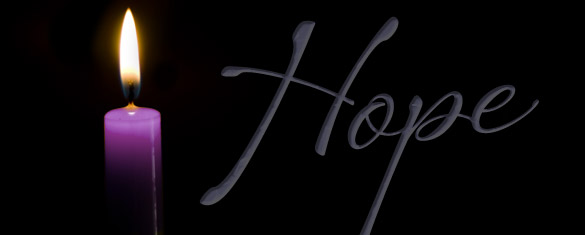I have been thinking about hope a lot these last weeks. Not long ago, I was discussing the state of politics in America. Towards the end of the conversation, the discussion shifted to what the other person felt was the non-repairable rift in American political discourse. He went on to say that we are so divided and angry that there is no way we can even come back. I disagreed. It might be pie in the sky, but I have hope that we will return to a more civilized way of interacting with each other.
As a Christian and as a member of the human race, I live in hope. I have to live in hope because I do not have another option. To not live in hope is to give up, and that is simply not part of my plan. I live in hope because the Gospel of Jesus Christ is all about hope, hope that things will get better. But we have to be part of that process.
On Sunday, we began the Advent season and lit the first candle of the Advent wreath, which represents hope. Someone once said that without hope, we have nothing. So it is no mistake that the themes of Advent begin with hope since hope is the anchor for everything else.
According to Chan Hellman of the Hope Research Center at the University of Oklahoma, hope is “the belief that your future will be better than today and you have the power to make it so.” Tomorrow will be better, but we have to make it so. But we cannot do it alone.
Hellman says that hope is a simple concept that we tend to make more complicated than it needs to be. Hope involves goals, pathways, and willpower. First, we set the goal, whatever that may be. The next step is to make a plan to fulfill that goal. If it is a long-term goal, there need to be intermediate steps along that path to pile up the wins that keep us going. But none of that is possible without willpower. If we do not have the desire to see that goal being met, we will fail.
Although the goal may be ours alone, we cannot get there alone. Hope is a social construct and requires us to be around other people with hope. Hope is infectious and will draw others to us. I am convinced that the energy we put into the universe is the energy we attract back. If we project positive, hopeful energy into the world, it will come back to us and assist us in reaching that goal.
But beware of those who are, as best-selling author Lara Love Hardin calls them, “hope suckers.” These are the people who suck the hope right out of you. They are so negative that just being around them brings you down. It is hard enough to drag yourself across the finish line. You do not need to be carrying the hope suckers with you.
In Paul’s first letter to the Church at Corinth, he says that faith, hope, and love are the only things that last. (1 Corinthians 13:13) Hope is the anchor; hope is the thing that keeps us grounded and keeps us on the path. The idea that tomorrow can be better is rooted in hope; we must have hope!
When that first candle was lit on Sunday, I was reminded that the candle of hope is the one that will burn the longest and will become the shortest. Christians are called to bring light into the world, and throughout Advent, we are reminded that the light, Jesus, has overcome the darkness once and for all.
Advent is the season of hope. We have that hope because we know that tomorrow can and will be better.

